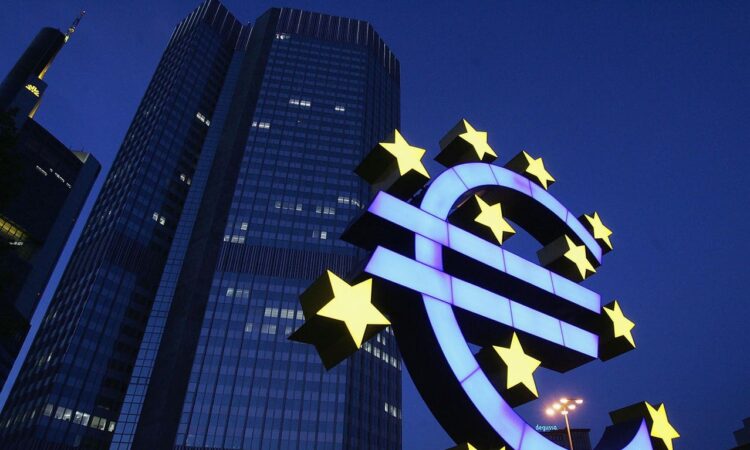
FRANKFURT, GERMANY – JUNE 13: A huge euro logo is seen in front of the headquarters of the European … [+]
As the global economy becomes increasingly driven by technological innovation, Europe finds itself at a critical juncture. Despite being home to world-class universities, talented entrepreneurs, and some of the world’s largest companies, the European Union is struggling to keep pace with the United States and China in creating and scaling innovative startups. At the heart of this challenge lies Europe’s underdeveloped venture capital (VC) ecosystem, which is hampering the continent’s ability to finance and grow the next generation of tech giants.
The numbers paint a stark picture. A recent IMF analysis post and Working Paper has shed more light on this exact challenge. Over the past decade, annual VC investments in the EU averaged a mere 0.2% of GDP, less than one-third of the 0.7% seen in the United States. From 2013 to 2023, EU VC funds raised about $130 billion compared to a staggering $924 billion raised by US VC funds. This massive funding gap is causing many of Europe’s most promising startups to look abroad for capital, often leading to their eventual relocation.
“Europe is losing out on both the direct growth benefits and positive spillovers from these innovative firms,” says Nathaniel Arnold, an economist at the International Monetary Fund and co-author of a recent study on European VC. “Many of the most successful EU startups move elsewhere for financing, causing a brain drain and loss of economic potential.”
Figure 13., page 26 of “Stepping Up Venture Capital to Finance Innovation in Europe” International … [+]
The Roots of Europe’s VC Deficit
Several factors contribute to Europe’s VC shortfall:
- Fragmented markets: Despite progress on integration, the EU remains a patchwork of 27 countries with different languages, laws, and business cultures. This fragmentation makes it harder for startups to scale across borders and for VC firms to raise large, pan-European funds.
- Risk-averse investment culture: European households and institutional investors tend to be more conservative with their capital, placing a larger proportion in bank deposits and bonds rather than equities and VC funds.
- Regulatory hurdles: Complex and sometimes contradictory regulations, especially for pension funds and insurers, make it difficult for these large pools of capital to invest in VC.
- Lack of exit options: With fewer large tech acquirers and less liquid stock markets, European startups often struggle to find attractive exit opportunities, dampening overall returns for VC investors.
- Limited government support: While some European countries have implemented policies to boost VC, overall support lags behind the proactive stance taken by the US government since the 1980s.
The Consequences of Underinvestment
The repercussions of Europe’s VC deficit extend far beyond the startup ecosystem. It’s impacting the continent’s overall competitiveness, productivity, and ability to lead in crucial emerging technologies.
Figure 17., page 28 of “Stepping Up Venture Capital to Finance Innovation in Europe” Sources of VC … [+]
“If we don’t address this funding gap, Europe risks falling further behind in critical areas like artificial intelligence, quantum computing, and clean energy technologies,” warns Margrethe Vestager, Executive Vice President of the European Commission. “This isn’t just about creating the next Google or Facebook – it’s about securing Europe’s economic future and strategic autonomy.”
Indeed, the numbers are concerning. European VC investments in clean tech sectors – crucial for the continent’s ambitious climate goals – are just a fraction of US levels. In 2021, EU27 countries invested €3.8 billion in clean tech VC deals, compared to a whopping €35 billion in the US.
The productivity gap is equally alarming. Real output per hour worked in the EU is now 26 percentage points lower than if it had kept pace with US productivity growth since 2000. This widening gulf can be partly attributed to Europe’s difficulty in financing and scaling innovative firms that drive productivity gains.
Signs of Progress
Despite these challenges, there are glimmers of hope on the European VC landscape. Several positive trends and initiatives are worth noting:
- Growing ecosystem: While still behind the US, Europe’s VC scene has shown impressive growth. Total VC investment in the EU reached €45 billion in 2022, up from just €5 billion a decade ago.
- Success stories: Companies like Spotify, Adyen, and BioNTech have shown that European startups can achieve global success, inspiring a new generation of entrepreneurs.
- Government initiatives: The European Investment Fund (EIF) has become a cornerstone investor in many European VC funds, helping to catalyze private investment. National initiatives, like France’s €4 billion “Tibi plan” to boost tech investments, are also showing promise.
- Regulatory improvements: The European Commission has proposed reforms to make it easier for pension funds and insurers to invest in VC, though implementation remains a work in progress.
- Emerging hubs: Cities like Berlin, Paris, and Stockholm are developing vibrant startup ecosystems, attracting talent and capital from across the continent.
A Call to Action: Bridging the Gap
While these positive developments are encouraging, more decisive action is needed if Europe hopes to close its VC gap with the US. Here are some key recommendations for policymakers, investors, and entrepreneurs:
Figure 19., page 27 of “Stepping Up Venture Capital to Finance Innovation in Europe” Total VC Funds … [+]
- Complete the Capital Markets Union: The EU must redouble efforts to create a truly integrated financial market, reducing cross-border barriers for investors and making it easier for startups to access capital across the continent.
- Regulatory reform: Streamline and harmonize regulations for institutional investors, making it more attractive for pension funds and insurers to allocate capital to VC.
- Tax incentives: Implement well-designed tax breaks for VC investments, particularly in early-stage startups and strategic sectors like clean tech.
- Bolster public support: Expand the role of the European Investment Fund and national development banks in providing anchor investments and guarantees to VC funds, especially those focused on later-stage growth capital.
- Improve exit options: Work towards greater stock market integration in Europe and create incentives for large tech companies to acquire innovative startups.
- Cultivate talent: Invest in STEM education, make it easier for startups to attract global talent, and encourage entrepreneurship from an early age.
- Foster a risk-taking culture: Promote success stories, destigmatize failure, and create more opportunities for retail investors to participate in the VC ecosystem.
Guillaume Claveres, another co-author of the IMF study, emphasizes the urgency of action: “Given the pace of technological change, Europe cannot afford to wait. We need to implement these reforms now to ensure we don’t fall further behind in the global innovation race.”
The Road Ahead: Cautious Optimism
While the challenges are significant, there’s reason for cautious optimism about the future of European VC. The continent has shown it can produce world-class startups, and there’s growing recognition among policymakers of the need to support the innovation ecosystem.
“We’re seeing a real shift in mindset across Europe,” says Alain Godard, Chief Executive of the European Investment Fund. “There’s a growing understanding that we need to take more risks and think bigger if we want to compete globally. The talent and ideas are here – now we need to ensure the capital is too.”
Looking ahead, several factors could accelerate Europe’s VC growth:
- Maturing ecosystem: As more European startups achieve success and entrepreneurs reinvest their gains, a virtuous cycle of innovation and investment could take hold.
- Technological sovereignty: Geopolitical tensions are driving European policymakers to prioritise homegrown innovation in strategic sectors, potentially leading to more support for VC.
- Green transition: Europe’s ambitious climate goals could catalyze massive investment in clean technologies, creating opportunities for VC-backed startups.
- Remote work: The shift towards distributed teams could help European startups access global talent pools more easily, potentially accelerating their growth.
- US market saturation: As the US VC market becomes increasingly competitive, more American investors may look to Europe for opportunities, bringing capital and expertise.
The stakes are high. If Europe can successfully address its VC deficit, it has the potential to unleash a wave of innovation that could transform its economy and solidify its position as a global tech leader. Failure to do so risks consigning the continent to a future of technological dependence and sluggish growth.
Figure 20., page 28 of “Stepping Up Venture Capital to Finance Innovation in Europe” Growth Capital … [+]
Conclusion: We Make It Work, The Alternative – Falling Further Behind – Is Not An Option
The European Union stands at a critical juncture in its economic development. While the challenges facing its venture capital ecosystem and broader innovation landscape are significant, they are not insurmountable. By implementing a coordinated strategy that combines national-level initiatives with EU-wide reforms, Europe has the potential to close the gap with the United States and become a global powerhouse for innovation. The stakes are high – failure to act could result in continued productivity stagnation and a loss of economic competitiveness. However, success in bolstering the venture capital sector could unleash a wave of innovation, driving productivity growth, creating high-value jobs, and positioning the EU as a leader in critical technologies of the future, from artificial intelligence to clean energy. As the global economy increasingly rewards innovation and technological prowess, the time for Europe to act is now. With determination, smart policies, and a willingness to embrace change, the EU can transform its venture capital challenge into an opportunity for renewed economic dynamism and prosperity. The path forward may be challenging, but the potential rewards for European citizens and the global innovation ecosystem make it a journey worth undertaking.
As Jan Frie, the third co-author of the IMF study, concludes: “The next decade will be crucial for European venture capital. With the right policies and a concerted effort from all stakeholders, we can create an innovation ecosystem that rivals any in the world. The alternative – falling further behind – is simply not an option.”
The clock is ticking. It’s time for Europe to step up its game in the global VC arena – the continent’s economic future may depend on it.






